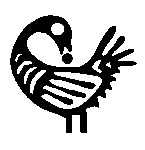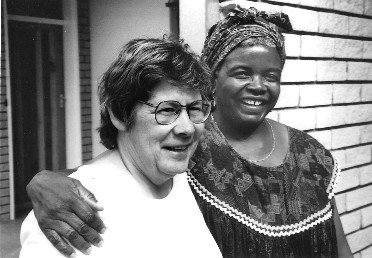
No Easy Victories: African Liberation and American Activists over a Half Century, 1950-2000
Gail Hovey, and Charles Cobb Jr.
Published by Africa World Press.
home
|
No Easy Victories: African Liberation and American Activists over a Half Century, 1950-2000 |
Edited by William Minter, Gail Hovey, and Charles Cobb Jr. Published by Africa World Press. |
|
An Unfinished Journey by William Minter The 1950s: Africa Solidarity Rising by Lisa Brock The 1960s: Making Connections by Mimi Edmunds
The 1970s: Expanding Networks by Joseph F. Jordan
The 1980s: The Anti-Apartheid Convergence by David Goodman
|
Featured TextThe following text is excerpted from No Easy Victories for web presentation on allAfrica.com and noeasyvictories.org. This text may be freely reproduced if credit is given to No Easy Victories. Please mention that the book is available from http://noeasyvictories.org and http://africaworldpressbooks.com. " South Africa Is Next to Namibia" : The Lutheran Connection
Solveig Kjeseth and Selma Shejavali. Dubuque, Iowa, might seem an unlikely hotbed of Southern African organizing, but National Namibia Concerns based at Wartburg Theological Seminary mobilized more than 10,000 American Lutherans to support Namibian independence and impose sanctions on South Africa. Among the founders were two couples, Abisai and Selma Shejavali and Peter and Solveig Kjeseth. The Shejavalis, originally from Namibia, returned to their country at the end of the 1970s. They played prominent roles not only in the Evangelical Lutheran Church in Namibia, but also in the Namibian Council of Churches and in the struggle for liberation. Peter and Solveig Kjeseth are both of Norwegian Lutheran immigrant stock, with family histories of commitment to social justice. Peter's great grandfather had left Norway as a poor farmer after being involved in peasant organizing. The couple met at the University of Chicago and spent the early 1960s in Geneva, where Peter worked with the Lutheran World Federation. When they met the Shejavalis at Wartburg, they already had been involved in organizing against the Vietnam War and had helped found the Dubuque County Democratic Club, a progressive alternative to the local established Democratic Party. It was Namibia, however, that became their life work. Solveig and Peter Kjeseth spoke with Christopher Saunders, a historian at the University of Cape Town, on April 2, 2005 at the bed-and-breakfast that the Kjeseths now run near Cape Town.
Solveig and Peter KjesethSolveig: In 1971, Wartburg Seminary - which is where Peter taught for 36 years - in Dubuque, Iowa began to receive Namibian pastors who were coming to do graduate work. The first Namibian, Abisai Shejavali, and his family stayed for about seven years. It was the Shejavalis who taught us where Namibia was and how to say the word " Namibia." Little by little, they - especially Dr. Shejavali's wife Selma - taught us about what was happening in their country. And little by little we learned and little by little their struggle became our struggle. So it was very personal - it wasn't that we set out looking for a cause. One moved in with us. Abisai Shejavali's father was a retired Lutheran pastor living near the border of Angola. South African soldiers came and brutally beat him and raped and blinded his wife. And at that time Abisai wrote a letter of protest to Prime Minister Vorster. Selma is a Ndonga royal and her uncle, who had cooperated with South Africa, was assassinated while they were at Wartburg. The uncle, King Filemon Elifas, had allowed open, public flogging of SWAPO supporters, so he was really hated. Selma says her uncle was not a bad man, but he was not strong and therefore he was used by South Africa. Peter: During the years Abisai was with us he became more and more politicized. When we first knew him, he [had] what I would now call a rather nanve belief that things were going to turn out quite well. Solveig: They had full confidence that the United States was going to come down on their side. But in the 1970s, as he saw the U.S. repeatedly vetoing economic sanctions against South Africa at the U.N., he could see how the U.S. clearly sided with South Africa. There was a little Namibia Concerns Committee at Wartburg - probably seven, eight people - and we began to study the issues and then we would accept invitations to speak at any little groups. Mainly it was women's church groups that Selma and I would speak to. And then Wartburg for the next 30 years always had Namibian pastors there, so with each succeeding year there was greater impact. Emma Mujoro was a Namibian pastor and she and I traveled hundreds and hundreds of miles on the back roads of Wisconsin and Iowa, talking about the situation in Namibia. By 1990, the mailing list had grown to 11,000 and represented virtually every state, including Hawai'i and Alaska. Peter: Dubuque is right at the corner of Wisconsin, Illinois, and Iowa, and not too far away from Minneapolis and that's the Midwest where Scandinavian Lutheran background is very influential. Solveig: The other thing was that every year Wartburg would graduate probably 50 young pastors who went all over the U.S., and every single one of them knew Namibians. Not all of them were involved politically, but they were aware of the story. They knew the issues and they would respond, you know, so over a period of a few years, the word spread. And they would have a captive audience where they were going: congregations. In 1977 apartheid was declared to be an issue of status confessionis by the Lutheran World Federation, which meant that we were called by our faith to oppose it. So apartheid and Namibia's occupation was seen as a religious issue, and appropriate to be addressed from the pulpit, in sermons or in publications. One of the things we did politically in those days - and I was so proud of how it worked - was that we asked people to put the question of Namibia on their local political [Democratic] " resolutions list." We have this tradition in Iowa that the candidates, the political candidates for U.S. president, come first to Iowa because Iowa's party caucuses are the earliest in the country. And I just loved it when Time magazine's reporter - it must have been in 1984 - wrote that " the candidates were asked about such esoteric questions as U.N. resolution 435." When I read that, I knew " that's our network!" It was very much a really grassroots movement. Just about everybody in the network had a passion for Namibia because it had become real for them; it was real people that they had gotten to know. It was the Shejavalis and the !Noabebs and the Mujoros and the Nambalas and the Uahengos and the Shivutes. It became much more than an abstract political issue. One last story, which I have to tell to a South African. I was at a church conference in Wisconsin during the struggle, with probably 1,500 women. We went for lunch at the college cafeteria, and I noticed there were a couple of black African women students, and two older white women, and I sat down near them. And these women, the whites, were asking the African students, " Oh! Are you from Africa?" " Yes, we're from South Africa." The two women looked puzzled for a moment. Then one brightened and asked, " Oh, South Africa . . . is that next to Namibia?" |
This page is part of the No Easy Victories website.